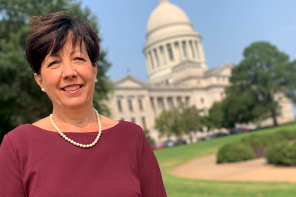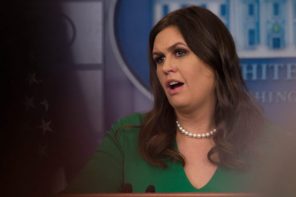It’s hard to believe so much time has gone by, but this fall marks five years since the six-week trial in a Harrisburg, Pa. courtroom following which federal Judge John E. Jones struck down the teaching of intelligent design in public school science class as unconstitutional, writing that it was merely revamped creationism posing as a scientific theory.
For many of us who were involved in the trial (I was a reporter at the local newspaper at the time who covered it), it was a life-changing experience. As I’ve said many many times, Kitzmiller v. Dover was this bright shiny moment at a very unsettling time in our nation’s history. Following the 2004 election of President George W. Bush, fundamentalist Christians and Patriot Pastors had been eying the courts as the next great battlefield. Additionally, science was not only under attack at the local school board levels, but all the way up to the Bush administration as well.
The victory proved that the system had not been hijacked, even though some Christian conservatives speculated before the trial that because he had been appointed by President Bush, Jones was in their pocket. Of course, that was not the case. Instead, when intelligent design was put on trial, it was exposed for the religious fraud that it is.
The victory also was a significant blow to the pro-intelligent design Discovery Institute, which had written about its goal of using intelligent design to drive a wedge into scientific materialism represented by evolution and “replace it with a science consonant with Christian and theistic convictions.”
For those who live in the fundamentally Christian conservative area of Dover, the case also meant something more. As Steve Stough, one of the plaintiffs and a science teacher in another school district, has said, before the trial, he often felt like an outsider in his community. But it brought together people like him who loved science and value religious freedom and civil liberties. Today, he no longer feels like an outsider.
Last weekend, folks connected to Dover’s winning side gathered at my home to celebrate the victory that the decision meant for science education, religious freedom, and the First Amendment.
Parents, teachers, lawyers, and scientists were all there. People came from all over the country: Louisiana, California, Florida. We drank and ate and discussed our families, our work and our vacations. We rehashed funny and poignant moments from the trial and board meetings. It was a community effort and just as during the trial, everyone played to their strengths. Kevin Padian, who during the trial testified to the wealth of information about evolution in the fossil record, manned the grill. Eugenie Scott, executive director of the National Center of Science Education, made French toast for everyone Sunday morning. Plaintiff attorney Steve Harvey organized a guided tour of the Gettysburg Battlefield for all the folks from out of town. Barbara Forrest, the philosopher of science and the woman who defense attorney Richard Thompson tried to portray as an evil atheist, brought pralines and proudly showed photos of her children.
Additionally, we also discussed what was accomplished and speculated on where the next big anti-evolution battle will likely occur. Can anyone say, “Academic freedom reunion in Louisiana?”
But even as people were having these discussions and patting themselves a bit on the back for a job well done, Delaware’s Republican Senatorial candidate and Tea Party darling Christine O’Donnell, in gearing up for this week’s debate with Democratic rival Chris Coons, was about to prove yet again just how ignorant much of the public remains on this issue half a decade later.
As pretty much everybody with YouTube access knows, O’Donnell invoked Dover’s battle when she raised the issue of intelligent design and asked her opponent during the Widener Law School debate, “Where in the Constitution does it say ‘separation of church and state?’” What irked me the most was that she uttered those words with a little smirk designed to convey that she for some reason considered herself to be the smartest person in the room. But then as Charles Darwin wrote, “Ignorance more frequently begets confidence than does knowledge.”
So while I’m reminiscing here, O’Donnell’s remarks eerily reminded me of the words of Dover school board member Bill Buckingham. On the day of his testimony during the trial, he had brought to court a copy of the US Constitution from which he planned to read from on the stand. His reason? As he told me later, “Because nowhere in the Constitution does it say, ‘separation of church and state.’”
(Which forces me to digress a bit here. Do readers think that when people like O’Donnell and Buckingham point this out that they really think this is a new discovery that liberals have been hiding? Or are they trying to somehow make a rhetorical point?)
But Steve Harvey, the attorney who questioned Buckingham for the plaintiffs, wasn’t interested in Buckingham’s views on Constitutional law and the school board member never had the chance to enlighten the courtroom. But it got me wondering how Harvey might have responded to Buckingham’s assertion, so I sent him an email and asked him.
Harvey wrote back within minutes, starting out with the obvious, “The words ‘separation of church and state’ admittedly do not appear in the text of the First Amendment. Instead it says: “Congress shall make no law respecting an establishment of religion.””
Harvey continues:
The Supreme Court held years ago that this clause applies against the states through the due process clause of the 14th Amendment. So the clause says that Congress and the States (which includes local government including school boards) “shall make no law respecting an establishment of religion.” As lawyers we know what the word “shall” means. It is a strong command and means that there is no leeway. What shall the government do or not do? “[M]ake no law.” Not any laws. None at all. The words “no law” are followed by the word “respecting,” another broad term, which means “regarding” or “concerning.” So there is a very broad command to make no law regarding “an establishment of religion” or, if you like, establishing religion. In modern parlance, government is prohibited from making any laws establishing religion.
As Harvey makes clear, separation of church and state is merely a metaphor for the very clear dictate of the Establishment Clause, which the courts have largely upheld, especially as it relates to teaching evolution in the public schools. Which leads me to something else. As Harvey points out, O’Donnell might want to read up on the 14th Amendment, because she referred to the government imposing its values and values on school boards in violation of the constitution. I think she may not understand that school boards are government entities, and not just a collection of people who get together twice a month to drink coffee and chat about their kids. As O’Donnell said during the debate:
Local schools do not have the right to teach what they feel? Well, there you go… talk about imposing your beliefs on the local school.
I’m saying of the local community wants to teach the theory of evolution, then it’s up to the school board to decide. But when I made those remarks, it was because the school board wanted to also teach the theory of intelligent design and the government said they could not. You have just stated that you will impose your will over the local school district and that is a blatant violation of our Constitution.
Then she went on to add:
Talk about imposing your beliefs on the local schools. You’ve just proved how little you know not just about constitutional law but about the theory of evolution.
Sadly, O’Donnell’s statement revealed a stunning lack of knowledge of both. As Harvey wrote to me:
In the Kitzmiller v. Dover Area School Board case we were trying to stop the school board from establishing the Christian faith (or at least one particular view of the Christian faith) in public school science class by suggesting to students, in contravention of well accepted scientific concepts, that evolution is unfounded or at least questionable as a matter of science, and that students should consider as an alternative scientific explanation the concept that life and living things were created by a supernatural “intelligent designer” that everyone knows to be a reference to God.
Harvey went on to conclude:
I would also say that the rule of law followed by Judge Jones in the Kitzmiller case not only finds strong support in the text of the First Amendment, but also that it is the only rule that truly makes sense for us as Americans. What good would come from permitting government to sneak a little (or a lot of) religion in here and there? As Justice O’Connor has said: “Those who would renegotiate the boundaries between church and state must therefore answer a difficult question: Why would we trade a system that has served us so well for one that has served others so poorly?”
Sadly, I think O’Donnell’s remarks served as a timely reminder that for church-and-state watchdogs, the price of freedom is constant vigilance and that the jokes of Dover’s champions gathering for another reunion from another trial are hardly farfetched.





